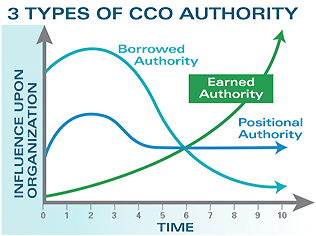Three Types of CCO Authority
 Authority is the currency of the C-Suite. I'm not talking about the chest-beating, testosterone-laden, "hear me roar" type of authority. Instead I'm speaking of the "Our customer has a problem, let's everyone work together to resolve it and make more money in doing so" type of authority. Most chief customer officers or similarly titled loyalty executives do not own all customer-facing personnel and therefore must lead by influence to effectively resolve customer issues or enhance the end-to-end customer experience and ultimately, increase revenue and profits.
Authority is the currency of the C-Suite. I'm not talking about the chest-beating, testosterone-laden, "hear me roar" type of authority. Instead I'm speaking of the "Our customer has a problem, let's everyone work together to resolve it and make more money in doing so" type of authority. Most chief customer officers or similarly titled loyalty executives do not own all customer-facing personnel and therefore must lead by influence to effectively resolve customer issues or enhance the end-to-end customer experience and ultimately, increase revenue and profits.
Even as a direct CEO report, the chief customer officer or other loyalty executive may be challenged to obtain the authority needed to get the job done. There are three types of authority for the CCO: borrowed authority, positional authority and earned authority.
Every CCO or loyalty executive has some Positional authority derived from the position and title they hold within the organizational hierarchy. CCOs relying upon positional authority may own many if not all customer-facing personnel such as service, support, consulting, and sometimes marketing and sales. Using positional authority the CCO can point to his or her direct reports and say, "make it so" in order to address customer issues. Beyond the initial bump in influence when the CCO catches people's attention as something new and unexpected in the organization, this form of authority tends to be static and may not carry the weight of either borrowed or earned authority.
Borrowed authority is gained through the strong, vocal, and very visible support of the CEO. The more prominently the CEO advocates for the CCO and reinforces customer-centric imperatives, the stronger the halo-effect and the greater the influence the CCO has over the organization. Borrowed authority is strong in the early days of a CCO's appointment but tends to wane as the attention of the CEO turns to other initiatives.
Earned authority occurs when CCO led initiatives are seen to be successful both internally and externally. Authority is earned as the CCO leads peers, executives, and employees to recognize how customer insight and centricity can be valuable aids in achieving their own business, department, and personal goals.
Many CCOs begin with positional authority and borrow heavily additional authority from the CEO. The most effective CCOs with the longest tenure are those who quickly earn their own authority. Ultimately, such earned authority can eclipse both positional and borrowed authority in power and value. Earned authority is the strongest and most sustainable type of authority, enhancing both positional and borrowed authority as it increases.
How can a CCO effectively earn greater authority within the organization? There are three ways to do so:
- Own actionable customer insight
- Develop strong relationships with management, peers, employees, and customers
- Demonstrate quantifiable results tied to revenue and profitability
NOTE: This page is excerpted from The Bingham Advisory, a ground-breaking publication designed to define and clarify the role of the chief customer officer in today's global business fabric. Authored by Curtis N. Bingham, the worldwide expert on CCOs, The Bingham Advisory is available for download here.